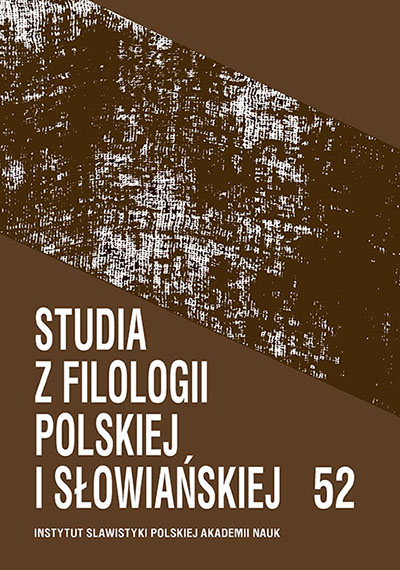Problematyka pożyczek ukraińskich w polskiej gwarze górali bukowińskich
The problem of Ukrainian borrowings in the Polish dialect of Bukovinian highlanders
Author(s): Helena KrasowskaSubject(s): Lexis, Philology
Published by: Instytut Slawistyki Polskiej Akademii Nauk
Keywords: Polish dialect in Bukovina; Ukrainian borrowings; Carpathian Bukovina; Bukovinian highlanders; language contact in Bukovina;
Summary/Abstract: The article is based on dialectal material, collected from Bukovinian highlanders according to the guidelines published in the All-Carpathian Dialect Atlas, in which a considerable role is played by Ukrainian vocabulary. The latter has been divided into two groups: 1) natively Ukrainian words; and 2) words that are borrowings in Ukrainian, and that have become part of the Bukovinian highlanders’ lexicon presumably via Ukrainian. Noteworthy in the first group (Ukrainian borrowings) are the words commonly used in all six studied villages. The Ukrainian lexemes used in four or five of the villages either: a)while having a Slavic origin, are also known in Romanian; or b) are words of Proto-Slavic origin. Finally, borrowings appearing in one, two or three villages can probably be explained by the influence of the state language on the dispersed highlander population. In the second group of borrowings, i.e., farther borrowings in Ukrainian, the most frequent of subgroups are Hungarian borrowings into Romanian and Ukrainian. Another subgroup are Latin borrowings, which must have been passed to Ukrainian through Romanian, as well as direct or indirect borrowings from Turkish. The material also features borrowings from Romanian, German via Polish, and French. Ukrainian borrowings in the Polish dialect of Bukovinian highlanders are a difficult interpretational and classificatory problem. The question of whether the highlanders borrowed these words from Ukrainian or Romanian cannot be answered unambiguously, especially since between 1918 and 1944 Bukovina was a part of Romania and Romanian was the language of education, official communication etc. Similarly, we do not know if the words originating from Romanian have been borrowed directly from this language or via Ukrainian. The same can be applied to Hungarian and German. The presented material can thus only be treated as one part of the vocabulary of the Bukovinian highlanders’ dialect.
Journal: Studia z Filologii Polskiej i Słowiańskiej
- Issue Year: 2017
- Issue No: 52
- Page Range: 164-185
- Page Count: 22
- Language: Polish

